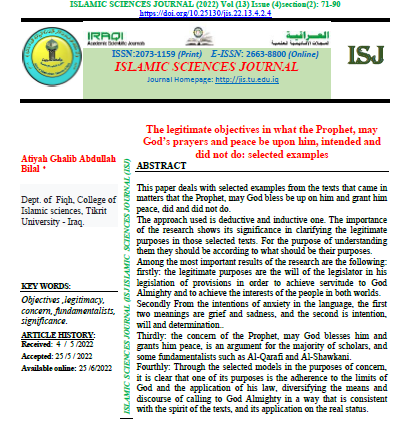The legitimate objectives in what the Prophet, may God’s prayers and peace be upon him, intended and did not do: selected examples
Main Article Content
Abstract
This paper deals with selected examples from the texts that came in matters that the Prophet, may God bless be up on him and grant him peace, did and did not do.
The approach used is deductive and inductive one. The importance of the research shows its significance in clarifying the legitimate purposes in those selected texts. For the purpose of understanding them they should be according to what should be their purposes.
Among the most important results of the research are the following: firstly: the legitimate purposes are the will of the legislator in his legislation of provisions in order to achieve servitude to God Almighty and to achieve the interests of the people in both worlds.
Secondly From the intentions of anxiety in the language, the first two meanings are grief and sadness, and the second is intention, will and determination..
Thirdly: the concern of the Prophet, may God blesses him and grants him peace, is an argument for the majority of scholars, and some fundamentalists such as Al-Qarafi and Al-Shawkani.
Fourthly: Through the selected models in the purposes of concern, it is clear that one of its purposes is the adherence to the limits of God and the application of his law, diversifying the means and discourse of calling to God Almighty in a way that is consistent with the spirit of the texts, and its application on the real status.
Article Details

This work is licensed under a Creative Commons Attribution 4.0 International License.
COLLEGE OF ISLAMIC SCIENCES, TIKRIT UNIVERSITY. THIS IS AN OPEN ACCESS ARTICLE UNDER THE CC BY LICENSE http://creativecommons.org/licenses/by/4.0/

